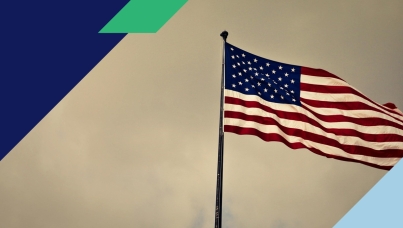

Veterans weigh cost, convenience, and provider background in mental health care choices
Washington DC, November 7, 2025 – A new Ipsos survey, in collaboration with Luminary Labs, examines Veterans’ opinions related to getting mental health care. The findings reveal that mental health care providers’ availability and background are more important to Veterans than whether the provider is at a VA or community care facility. However, when choosing between providers at different facilities, Veterans rate cost as the top reason for choosing VA, while they rate having a closer location as the top reason for choosing community care. When it comes to considering new forms of mental health care, Veterans are most likely to consider using wearable devices, online peer-support groups, and mobile apps with mental health tools and resources.
Veterans believe that other Veterans are most likely to look for mental health care during crisis situations over other times in their lives. However, some Veterans report concerns about getting mental health care, including worrying that they will be judged or experience negative career impacts and a desire to handle their mental health alone. Veterans also have mixed opinions on whether their family and close friends understand their mental health needs related to their military service.
Detailed findings
1. Mental health care providers’ availability and background are more important to Veterans than being at a VA or community care facility.
- The most important factors for Veterans when looking for a mental health care provider were that the provider offers evening or weekend appointments (37%), the provider has military experience or training (34%), and the provider has a similar cultural background (31%).
- Veterans put less importance on the provider’s facility type and rated the importance of being at a VA facility (27%) or a community care facility (27%) similarly.
- The provider offering evening or weekend appointments was rated as more important by Veterans ages 18-49 (49%) and ages 50-64 (40%) than by those ages 65+ (29%).
- Being located at a VA facility was rated as more important by the following: (1) Veterans with an income under $50,000 (42%) vs. $50,000-$99,999 (21%) and $100,000+ (23%), and (2) Veterans with a high school education or less (33%) and some college (29%) vs. bachelor’s degree or higher (20%).
Providers’ availability and background are important to Veterans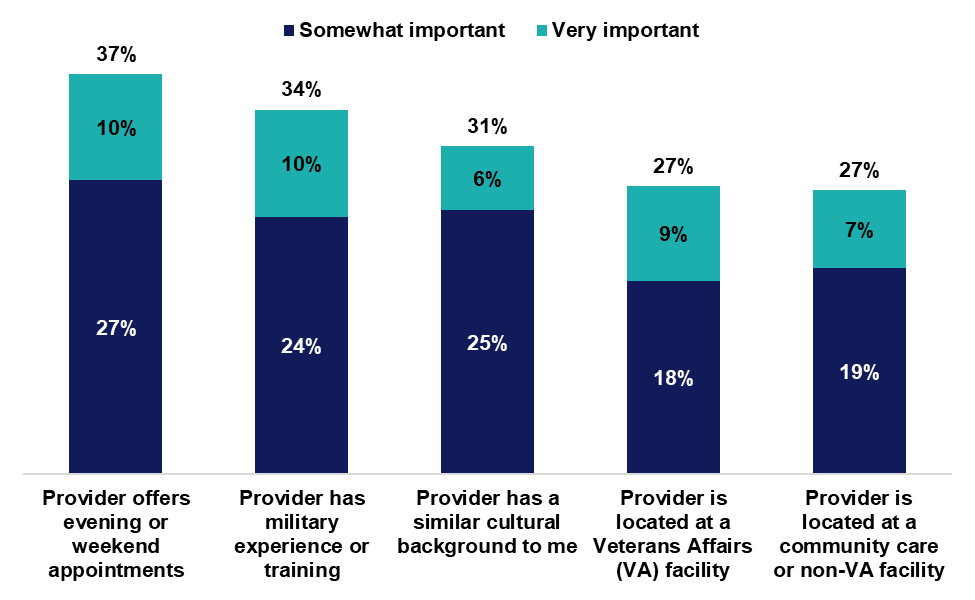
Q1. When looking for a mental health care provider, how important are the following to you?
2. Cost is the top reason why Veterans get mental health care at a VA facility, while a closer location is the top reason for choosing a community care facility.
- When looking at reasons why Veterans choose to get mental health care at a VA facility instead of at a community care facility, cost (74%) was selected most often, followed by recommendations from other Veterans (50%).
- Cost was the top-selected reason for choosing a VA facility for all demographic groups. Being recommended by other Veterans was selected more often by respondents with an income of $100,000+ (54%) and $50,000-$99,999 (53%) compared to those under $50,000 (38%), as well as by those with a bachelor’s or higher education (59%) compared to those with some college (46%) and a high school education or less (43%).
- Alternatively, when looking at reasons why Veterans choose to get mental health care at a community care facility instead of at a VA facility, the most common reasons were a closer location (54%), shorter wait times (39%), and more provider availability (36%).
- When choosing a community care facility, a closer location was selected more often by those with a bachelor’s or higher education (61%) than by those with some college (51%*) and a high school education or less (49%). Shorter wait times was selected more often by Veterans ages 18-49 (45%) and ages 50-64 (43%*) than by those ages 65+ (33%), as well as by Veterans living in an urban/suburban area (42%) vs. those in a rural area (31%). More provider availability was selected more often by Veterans with a bachelor’s or higher education (43%) and some college (38%) than by those with a high school education or less (26%). It was also selected more often by Veterans making $100,000+ (41%) compared to those making under $50,000 (29%), with those making $50,000-$99,999 (35%) in between.
Cost is the top reason why Veterans choose VA for mental health care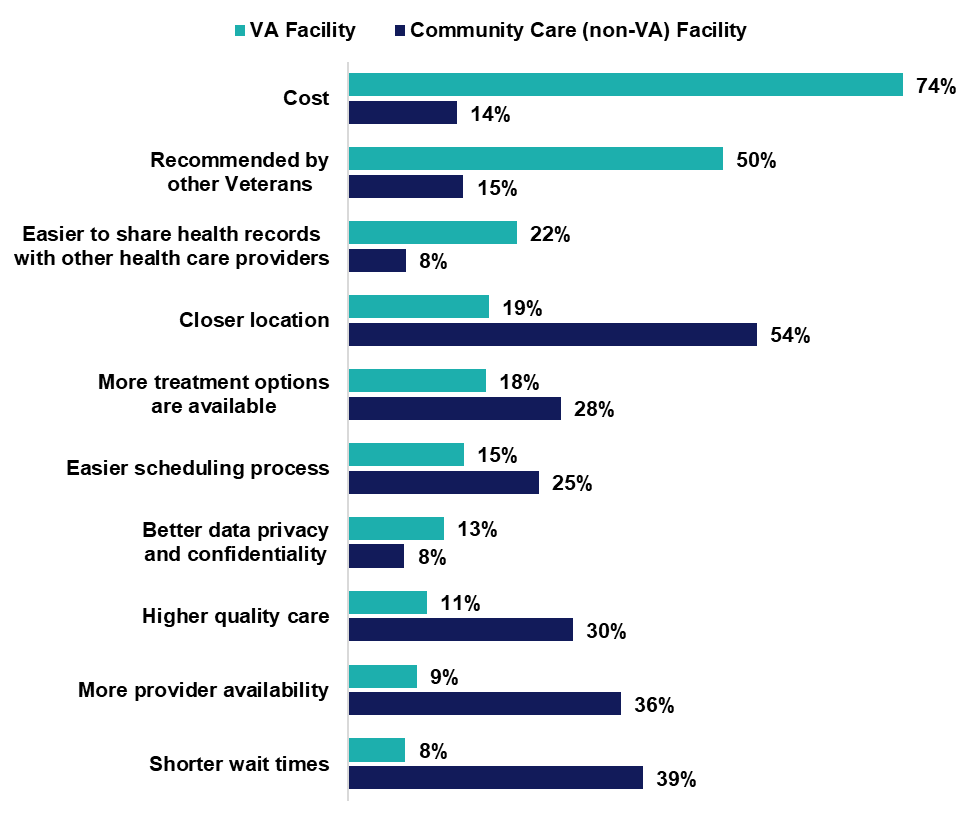
Q2. What do you think are the top 3 reasons why some Veterans choose to get mental health care at a VA facility (instead of at a community care or non-VA facility)? Please select up to 3 reasons. / Q3. What do you think are the top 3 reasons why some Veterans choose to get mental health care at a community care or non-VA facility (instead of at a VA facility)? Please select up to 3 reasons.
3. Veterans believe other Veterans are most likely to look for mental health care in times of crisis.
- Respondents said that Veterans are most likely to look for mental health care during crisis situations (such as when problems severely affect their daily life or when family or friends express serious concern; 38%), followed by during major life events (such as job loss, divorce, loss of a loved one, moving; 16%) and during periods of isolation or loneliness (13%).
Veterans are most likely to look for mental health care during a crisis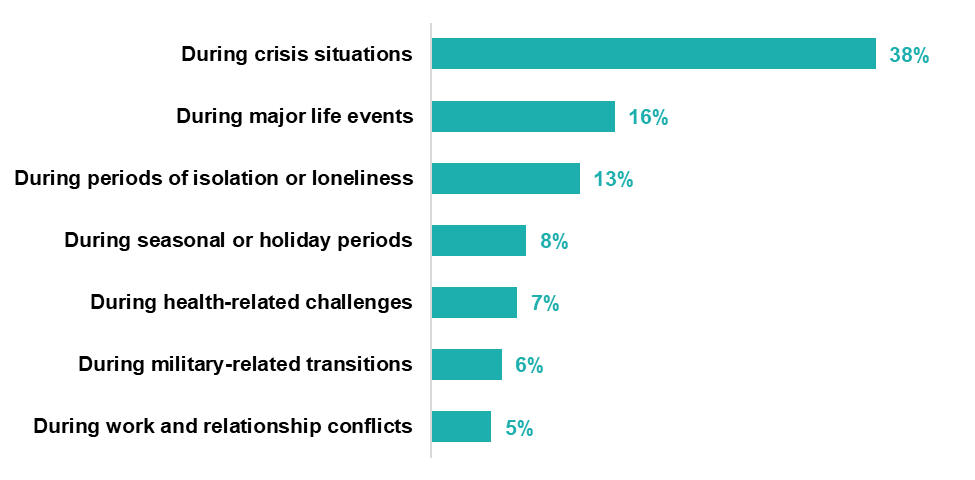
Q4. When do you think Veterans are most likely to look for mental health care?
4. Worrying about being judged and wanting to handle their mental health alone are Veterans’ most common concerns or issues related to getting mental health care.
- When asked whether they have ever had any concerns or issues related to getting mental health care, Veterans were most likely to say that they were worried about being judged or having a negative impact on their career (20%) and that they wanted to handle their mental health alone (17%).
- Veterans with an income of $100,000+ were more likely to say that they were concerned about being judged or having a negative career impact (25%) than those making under $50,000 (14%) or $50,000-$99,999 (17%*). This issue was also more of a concern for younger Veterans and was selected less often by older respondents (ages 18-49 = 36%, ages 50-64 = 22%, and ages 65+ = 8%).
- However, 61% of Veterans said they never had any of these concerns or issues related to getting mental health care.
Barriers to getting mental health care include worry about judgment and negative career impacts, as well as wanting to handle it alone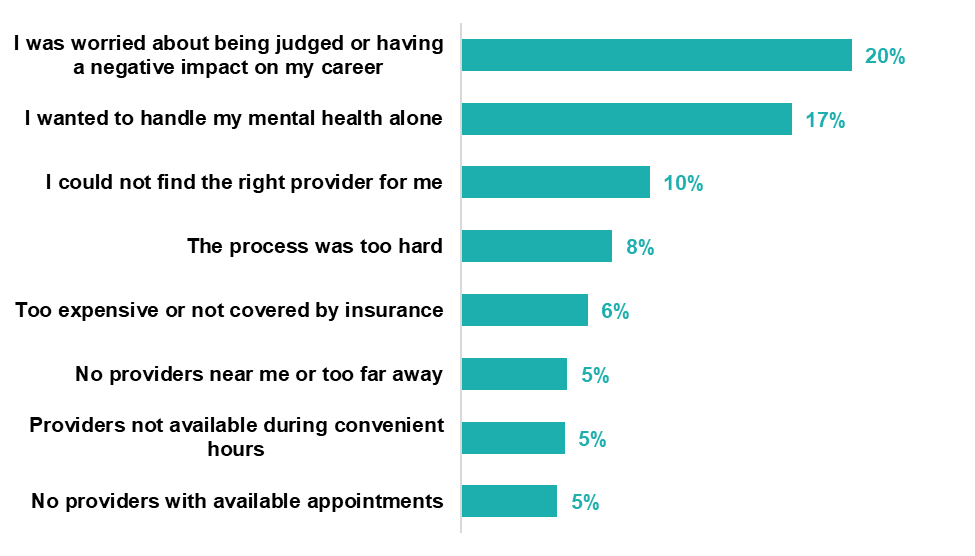
Q5. Have you ever had any of the following concerns or issues related to getting mental health care (both during your military service and afterwards)? Please select ALL that apply.
5. Veterans are most likely to use wearable devices compared to other new forms of mental health care.
- When asked about how likely they would be to use these new forms of mental health care, Veterans were more open to using wearable devices (such as smartwatches) that track sleep, stress, or mood changes (41%), followed by online peer-support groups with other Veterans (29%) and mobile apps that teach about mental health tools and resources (26%).
- Veterans were less likely to use other new forms of mental health care, including AI-powered chatbots (10%), AI-powered diagnostic or screening tools (19%), Virtual Reality-based mental health care (20%), and psychedelic-assisted therapy (when approved by a doctor; 21%).
- In general, younger Veterans (ages 18-49 and 50-64) and Veterans with a higher education (bachelor’s degree or higher) were more open to using most of these new forms of mental health care than older Veterans (ages 65+) and those with lower education (high school or less or some college).
Veterans are most likely to use wearable devices compared to other new forms of mental health care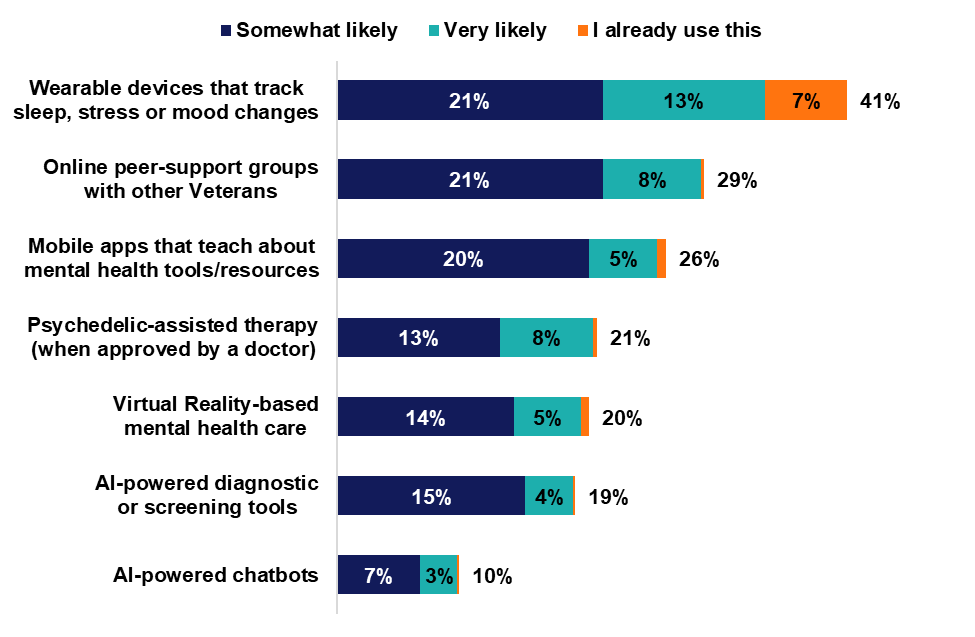
Q6. How likely are you to use the following new forms of mental health care?
6. Veterans’ opinions are mixed on whether their family and close friends understand their mental health needs related to their military service.
- One-third of Veterans said their family and friends understand their mental health needs related to their military service ‘very’ or ‘extremely well’ (32%), although few selected the highest rating of ‘extremely well’ (12%). However, one-third of Veterans said their family and friends do not understand their mental health needs well (32%), with another third falling in the middle at ‘somewhat well’ (34%).
- Veterans with a high school education or less were more likely to say their family and close friends understand their mental health needs ‘very’ or ‘extremely well’ (40%) compared to those with some college (28%) or a bachelor’s degree or higher (28%), as well as Veterans ages 65+ (37%) and ages 50-64 (34%*) vs. those ages 18-49 (22%).
Opinions are mixed on whether family/friends understand Veterans’ mental health needs related to their military service
Q7. How well do you think your family members and close friends understand your mental health needs related to your military service?
Note: * indicates a marginally significant difference.
About the Study
This study was conducted by Ipsos from August 22 to August 25, 2025, using the probability-based KnowledgePanel®. This poll is based on a nationally representative probability sample of 525 Veterans age 18 or older.
In our reporting of the findings, percentage points are rounded off to the nearest whole number. As a result, percentages in a given table column may total slightly higher or lower than 100%. In questions that permit multiple responses, columns may total substantially more than 100%, depending on the number of different responses offered by each respondent.
The survey was conducted using KnowledgePanel, the largest and most well-established online probability-based panel that is representative of the adult U.S. population. Our recruitment process employs a scientifically developed address-based sampling methodology using the latest Delivery Sequence File of the USPS – a database with full coverage of all delivery points in the U.S. Households invited to join the panel are randomly selected from all available households in the U.S. Persons in the sampled households are invited to join and participate in the panel. Those selected who do not already have internet access are provided a tablet and internet connection at no cost to the panel member. Those who join the panel and who are selected to participate in a survey are sent a unique password-protected log-in used to complete surveys online. As a result of our recruitment and sampling methodologies, samples from KnowledgePanel cover all households regardless of their phone or internet status, and findings can be reported with a margin of sampling error and projected to the general population.
The study was conducted in English. The data for the total sample were weighted to adjust for gender, age, race/ethnicity, education, Census region, metropolitan status, and household income. The demographic benchmarks for Veterans came from the 2024 August Supplement of the Current Population Survey (CPS). Specific categories used included the following:
- Gender (Male, Female)
- Age (18-44, 45-54, 55-64, 65-74, and 75+)
- Race/Hispanic Ethnicity (White Non-Hispanic, Black Non-Hispanic, Other or 2+ Races Non-Hispanic, Hispanic)
- Education (High School or Less, Some College, Bachelor or Higher)
- Census Region (Northeast, Midwest, South, West)
- Metropolitan status (Metro, Non-Metro)
- Household Income (Under $25,000, $25,000-$49,999, $50,000-$74,999, $75,000-$99,999, $100,000-$149,999, $150,000+)
The margin of sampling error is ±4.5 percentage points at the 95% confidence level for results based on the entire sample of Veterans. The margin of sampling error takes into account the design effect, which was 1.12.
About Ipsos
Ipsos is one of the largest market research and polling companies globally, operating in 90 markets and employing over 18,000 people.
Our passionately curious research professionals, analysts, and scientists have built unique multi-specialist capabilities that provide true understanding and powerful insights into the actions, opinions, and motivations of citizens, consumers, patients, customers, or employees. Our 75 solutions are based on primary data from our surveys, social media monitoring, and qualitative or observational techniques.
Our tagline "Game Changers" sums up our ambition to help our 5,000 customers move confidently through a rapidly changing world.
Founded in France in 1975, Ipsos has been listed on the Euronext Paris since July 1, 1999. The company is part of the SBF 120 and Mid-60 indices and is eligible for the Deferred Settlement Service (SRD).ISIN code FR0000073298, Reuters ISOS.PA, Bloomberg IPS:FP www.ipsos.com

